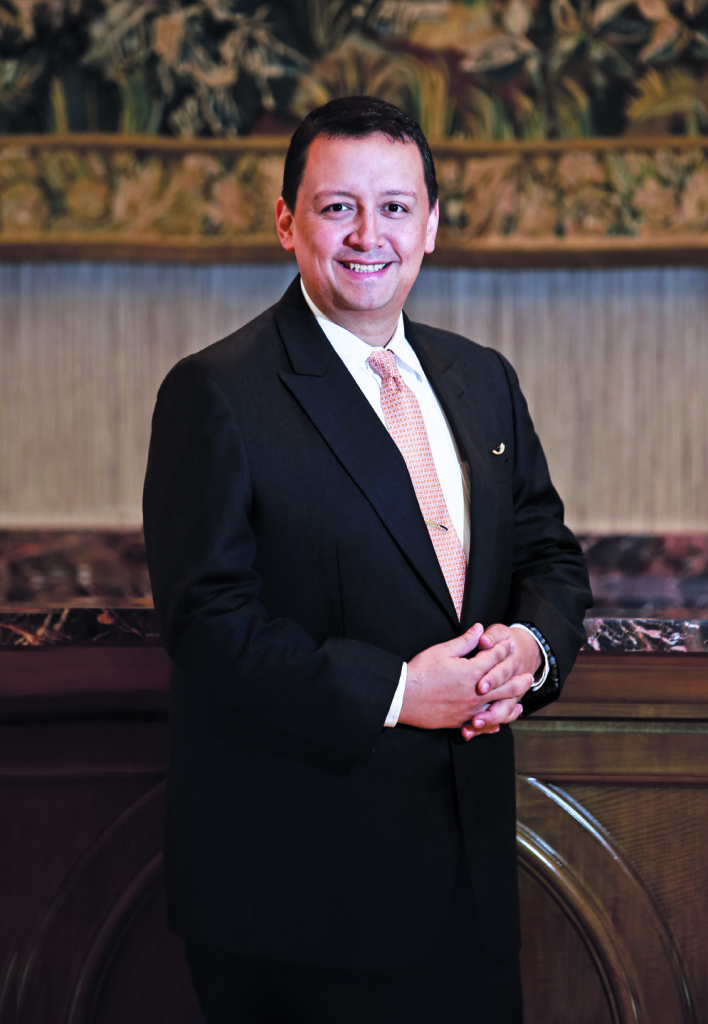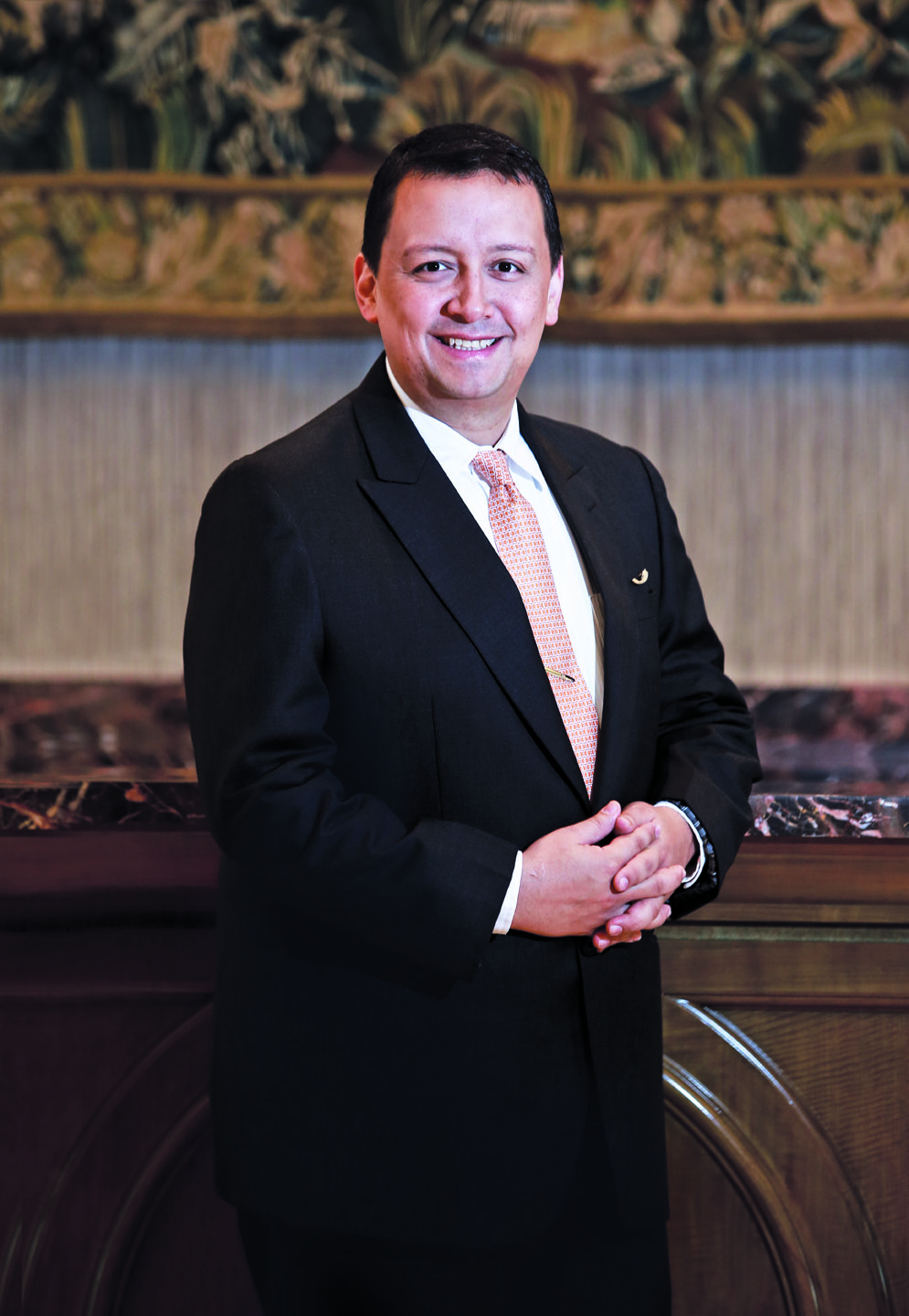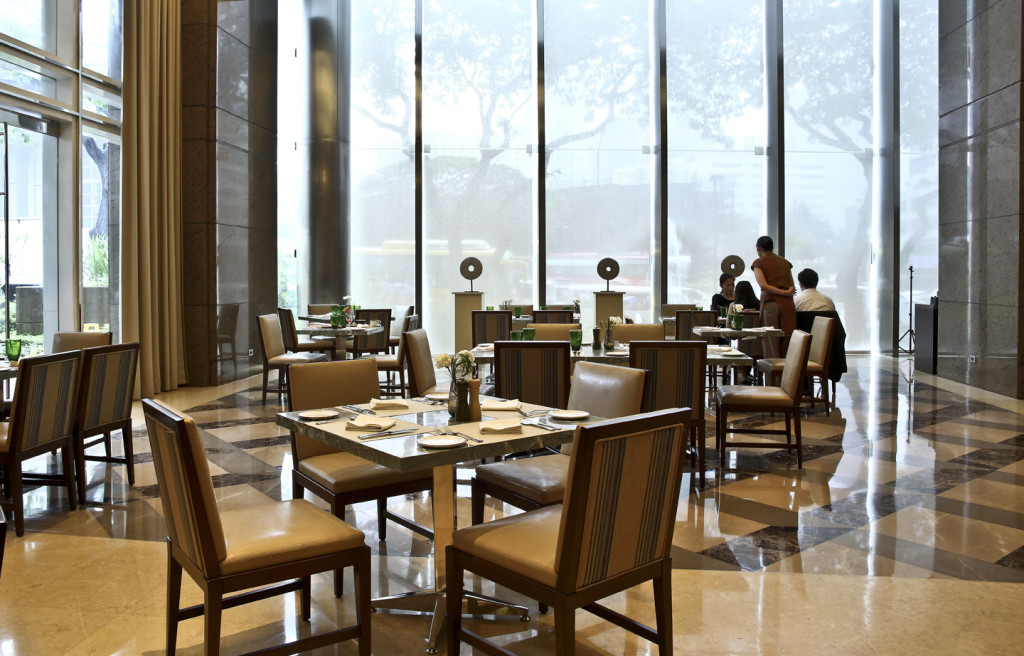Text by MAAN D’ASIS PAMARAN |
Photography by RENJIE TOLENTINO |
Grooming by FLOE TAPAYAN for NARS COSMETICS |
Primea Discovery general manager David Pardo de Ayala talks about crossing over from kitchen to corporate — and why it’s more fun in the Philippines.
He was a gutsy Colombian 20-something who flew all the way to Manila to follow his heart. Chef David Pardo de Ayala met his future wife, Gianella Rodriguez, while studying at New York’s Culinary Institute of America. He was smitten by the Filipina and decided to pursue her all the way back to Manila.
“I left everything behind, bringing just my knives. my cookbooks and the bold recklessness of youth,†he grins.
When he was more or less settled, he started looking for a job. “The first thing I did was to scout the dining scene and I went to the leading restaurants at the time, trying to see what was going on.†It was a mixed bag, he recalls, until he came across Chef Markus Gfeller at Grassi’s located at the Benpres Building in Pasig City.
“I introduced myself, what I was about, and what I was doing in the Philippines. We worked together for 10 years and opened a restaurant called Soleil, which was the first of a very important wave of restaurants in the late 1990s.â€
Discovering new passions
It was in 2005 when he accepted the position of corporate chef with the Discovery group. As corporate chef, he was in charge of menu development, promotion conceptualizations and kitchen design of all their F&B outlets. “I think my crowning glory as a corporate chef was that year when two of our restaurants made it to the top five of The Miele Guide for the Philippines,†he shares.
Shortly thereafter, he was promoted to resident manager of Discovery Suites Ortigas. Then he moved to Discovery Primea at Makati City’s posh Ayala Avenue as its general manager. “It is a completely different property. It is a brand new market for us in a wonderful location so it is, to quote, ‘an interesting challenge.’â€

He describes the Makati market as the most sophisticated in the country. “It is something that we have to keep in mind all the time. We are also a Filipino company jumping into a busy field where there are already international brands established in the area. We are a unique property; however, our aim is to take advantage of the things that make us unique. That is our strength.â€
He says that being a chef gave him an advantage in his new position. “It is quite unusual for a chef to become a GM, but I think people involved in the operations side, in general, have an upper hand. We know the back of the house, we know how the machinery works. For areas where I am not an expert, I have a talented pool of experts.â€
He likens a hotel’s general manager to an orchestra conductor. “You cannot expect the conductor to master every instrument in the orchestra. That is ridiculous; that is not his role. His role is to make sure that everybody plays to the same tune and in the same tempo. That is my role here, too.â€
Flavors of life
Food is really something close to his heart, he shares, practically growing up in their family kitchen in Bogota, Colombia. “Cooking, I believe, is the only vocation for me. My grandmother and my mother are very talented cooks and I was always surrounded by food. As you can see from my figure, I love food!†he says in jest.
He adds that his mother became an even better cook, after she learned principles of professional cooking from him. “She would surprise us with a very complex lasagna in 30 minutes, using the techniques I taught her, such as advanced preparations.â€
His own cherubic daughter, Sofia Gabrielle, has found her own way to the kitchen, even co-hosting a cooking show that ran for a season. “We had a couple of friends that had seen the videos of her I posted online, of us doing things like making pasta. One thing led to another and soon, we were shooting a pilot episode.†Their bonding time these days still consists of food-related activities as his precocious seven-year-old has decided to widen her palate range; they are trying out restaurants such as Indian and ramen places. “We also watch something called My Kitchen Rules, which starts at around the same time I get home from work.â€
(The Gilarmi Lounge)
On a sentimental note
David recalls trying to impress his date during their New York days. “I wanted her to experience my traditional food, so I took her on a long subway ride to a restaurant in a Colombian neighborhood in Queens. The food arrives on the table and she goes, ‘We have it in the Philippines; it’s called Arroz ala Cubana,’†he grins.
We have a lot in common, he says, owing to our shared Spanish heritage. “Our food has a lot in terms of variety because of our geography. In the land-locked city in the mountains where I come from, the soups are thick as they are meant to warm you up for the whole day. In the coastal area, soups are broth-based, similar to your sinigang. Even the architecture in our coastal cities are similar to what you would find in Intramuros.â€
Fun in the Philippines
David observes that the local culinary industry has grown by leaps and bounds since he first came here in 1997. “Restaurants cannot evolve without an ecosystem — we cannot cook food we have no market for, we cannot cook food that farmers are not willing to grow. Before, the only fresh herbs were parsley and basil; everything else was dried. Now, the interest in the Culinary Arts has continued to improve enormously. It has reached a point where we were able to successfully host the Madrid Fusión in Manila, which would have been inconceivable when I arrived years ago.â€
Speaking of which, he had absolutely no idea about the Philippines before he came over, he admits, but adds that there are several things that would and will work to the country’s advantage when it comes to drawing in tourists. “I cannot say that I have traveled extensively. But from what I have noticed from visiting other countries, the major difference is the sincerity of our hospitality. When you go to other countries, people are hospitable but you feel that it is because they are doing their job. Here, people really mean it. They really mean to put the well-being and comfort of the guest above everything else. From the humblest barangay to the five-star hotels, it is almost cliché but the smile and warmth of the people are really ingrained in the culture.â€
The ease with which Filipinos speak English is another facet to capitalize on, he says. “We should take advantage of the fact that English is spoken widely here, so tourists can feel a certain ease and comfort.†He adds, “We have a lot of discovered and undiscovered wonders in the Philippines. If everyone pulls in the same direction, the best is yet to come for Philippine tourism.â€






